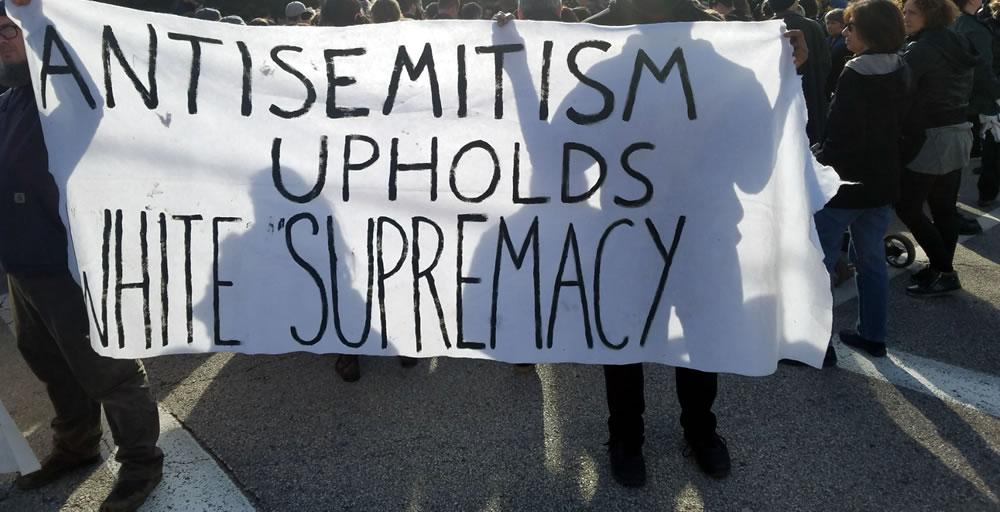On a sunny afternoon last Tuesday in Pittsburgh, about 200 demonstrators gathered outside the JCC in the Squirrel Hill neighborhood, a short distance from the Tree of Life*Or L’Simcha Synagogue in Pittsburgh where, on the previous Shabbat, the neo-Nazi assailant Robert Bowers gunned down 11 Jews who had gone there to pray.
The rally was one of several responses from the city’s left-wing and progressive groups to the visit that same Tuesday of U.S. President Donald Trump, whom the protestors blamed for encouraging a political climate in which a fanatic felt emboldened enough to murder Jews for the sole reason that they were Jews.
What, though, did those attending the rally understand by the word “anti-Semitism”? As I strolled among the crowd, I came across a large banner that read, “Anti-Semitism Upholds White Supremacy.” I asked the gentleman holding it if he minded my taking a photo, and he agreed. But when I tried to engage him in conversation about the banner, he demurred, and I didn’t push it.
I only mention that because what follows is simply my interpretation of that slogan. As I see it, the operative phrase here is “white supremacy”—and this reveals another key distinction between America and Europe.
In Europe, there is no question that anti-Semitism has been the deadliest and most enduring form of prejudice known on that continent—one that continues to plague its Jewish communities more than 70 years after the Nazis exterminated 6 million Jews. But in America, anti-Semitism has been merely one element of the Jewish experience, and not the most significant; by contrast, the legacy of slavery and segregation means that it is racism targeting African-Americans that has dominated the American public’s imagination.
Still, as the banner in Squirrel Hill suggested, that doesn’t exclude anti-Semitism from the equation entirely. By “upholding” white supremacy, anti-Semitism takes its place among the roster of prejudices—racism, homophobia, transphobia and so forth—which determine, insist progressives, that the quest for social justice is necessarily “intersectional.”
For the historical reasons I outlined above, this strategy makes a good deal more sense in America than it does in Europe. Yet there’s a danger of becoming too parochial, unable to recognize the prevailing forms of anti-Semitism—leftist, Islamist, the phenomenon of “anti-Semitism without Jews” in countries like Malaysia—outside of our country.
The first consideration is that anti-Semitism is a global phenomenon that manifests in different countries and different cultures at the same time. It unites its various followers in the core belief that the Jews are a “global” people, eternally suspect because they pursue their narrow, selfish interests across national borders.
At that point, the hatred of Jews develops national or religious characteristics that conform to the local environment. This is something we need to bear in mind when we stand up and challenge anti-Semitism in America: there are important differences in its manifestation in this country as compared with other countries.
Most important of all is that, historically, anti-Semitism has never been an organizing principle of American politics, in marked contrast to a list that includes France, Germany, Russia, Poland and most of the Middle East. Certainly, anti-Semitism has had its American proponents over the years, from the German-American Bund to Father Coughlin to the Nation of Islam. All of these groups have had their moments in the sun, but none of them have been strong enough to change how the vast majority of non-Jews in America think about their Jewish neighbors.
Because of that, American Jews have never had to confront the notion that they would be better off living elsewhere. In France, that has been a topic of conversation among Jews for nearly two decades—and thousands have acted on it, moving to Israel and to the United States—while in the United Kingdom, the state of the Labour Party under its far-left leader Jeremy Corbyn is provoking similarly angst-filled discussions.
American anti-Semitism, even when articulated through an assault rifle, has not had the same effect. None of the Jews I met in Pittsburgh this week were thinking remotely of leaving the country they love. As far as they are concerned, it is the anti-Semites and bigots who should get out of here—not the Jews and other minorities. In this moment of extraordinary pain, that is a heartening response, and one that reflects America’s proud history as a haven for the Jewish people.
Would that were the case in every other nation as well.


























